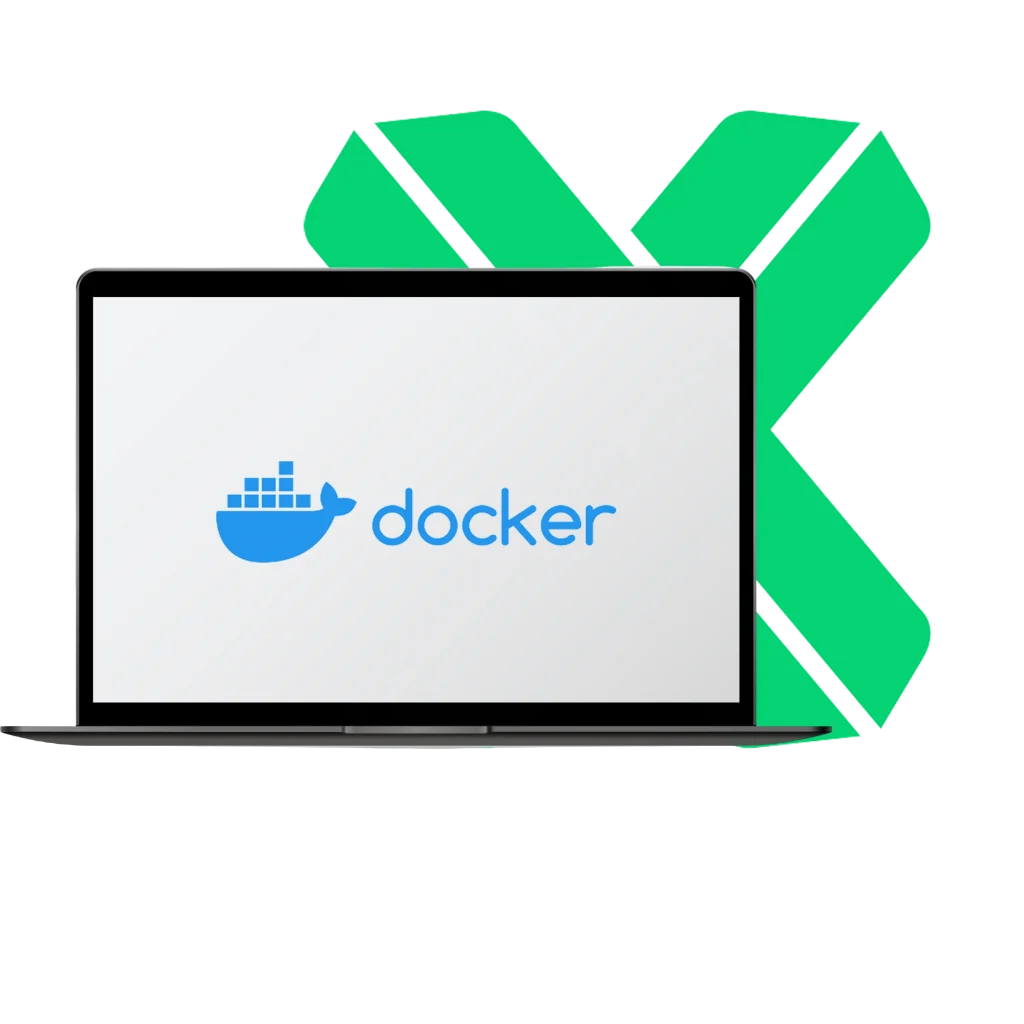DOCKER DEVELOPMENT COMPANY
Build scalable, containerized applications with Docker and nearshore talent.
We quickly assemble skilled teams to help you build efficient, secure, and portable applications using Docker’s container technology, ensuring seamless integration across environments.

+200 companies rely on
our 1% Top Talent

Docker Development Services We Provide
Containerization of Applications
We containerize your applications using Docker, enabling fast, consistent deployment across different environments. By packaging applications and their dependencies into Docker containers, we ensure portability, scalability, and reduced compatibility issues.
Microservices Architecture with Docker
We build microservices architectures using Docker, enabling you to break down monolithic applications into independent services. This approach allows for greater scalability, resilience, and faster deployment cycles, making your applications more adaptable to changing demands.
Docker Orchestration with Kubernetes
Our team integrates Docker with Kubernetes for container orchestration, enabling automatic scaling, load balancing, and management of containerized applications. This ensures your applications are highly available, resilient, and able to handle fluctuating workloads.
CI/CD Pipelines with Docker
We implement continuous integration and deployment (CI/CD) pipelines using Docker, allowing for faster, more reliable releases. By using Docker in CI/CD, we ensure that your applications can be tested, deployed, and scaled automatically with each new version.
Cloud Deployment with Docker
We deploy Docker containers across leading cloud platforms such as AWS, Google Cloud, and Microsoft Azure. Our solutions ensure that your containerized applications are fully optimized for the cloud, with seamless scaling and reduced infrastructure costs.
Docker Security and Compliance
We implement security best practices for Docker containers, including image scanning, role-based access control, and network segmentation. Our team ensures that your Dockerized applications comply with industry standards like GDPR, HIPAA, and PCI-DSS.
Why Choose Xpertsoft for Docker Development
Nearshore Expertise
Our developers are primarily based in Portugal, ensuring seamless collaboration with EU-based clients. With real-time communication and bilingual professionals, we provide efficient Docker development and support services.
Broad Technical Expertise
Beyond Docker, our team brings expertise in container orchestration, cloud-native development, DevOps, and microservices. We provide comprehensive solutions that ensure your applications are scalable, secure, and optimized for performance across different environments.
Tailored Container Solutions
We deliver flexible Docker development services that align with your business goals. Whether you need containerized microservices, CI/CD pipelines, or cloud deployments, we tailor our solutions to meet your performance and scalability needs.
The Docker Ecosystem We Used in Previous Work
Containerization and Orchestration
Leverage these tools to build and manage scalable containerized applications:
- Docker (for containerizing applications)
- Kubernetes (for orchestrating containers at scale)
- Docker Compose (for defining multi-container applications)
- Docker Swarm (for simple container orchestration)
Cloud Deployment and Infrastructure
Deploy your Docker containers across leading cloud platforms with these services:
- Amazon ECS (Elastic Container Service)
- Google Kubernetes Engine (GKE)
- Azure Kubernetes Service (AKS)
- AWS Fargate (for serverless container management)
DevOps and Automation
Automate container deployments and CI/CD pipelines with these tools:
- Jenkins (for continuous integration and delivery)
- GitLab CI/CD (for pipeline automation)
- Docker Hub (for storing and managing container images)
- Terraform (for Infrastructure as Code)
Security and Compliance
Ensure secure Docker containers and meet compliance standards using these tools:
- Docker Bench (for security auditing)
- Clair (for container vulnerability scanning)
- AWS IAM (for role-based access control)
- Falco (for real-time threat detection in containers)
Key Facts to Know About Docker Development
- Benefits of using Docker
-
1. Portability Across Environments
Docker containers package applications and their dependencies, ensuring that they can run consistently across any environment, whether it’s on-premise, in the cloud, or in development. This portability reduces compatibility issues and simplifies deployment processes.
2. Scalability and Resource Efficiency
Docker containers are lightweight, using fewer system resources than traditional virtual machines. This allows for higher scalability and improved resource efficiency, enabling you to run more containers on the same infrastructure.
3. Simplified Microservices Development
Docker simplifies the development and deployment of microservices by allowing each service to be containerized independently. This results in faster development cycles, easier scaling, and better fault isolation between services.
- What Docker is primarily used for
-
Docker is primarily used for containerizing applications, enabling consistent and scalable deployments across different environments. It’s widely adopted for microservices architectures, CI/CD pipelines, cloud-native applications, and DevOps workflows.
- Reasons for Docker’s popularity
-
- Faster Time-to-Market: Docker containers allow developers to build, test, and deploy applications faster by automating repetitive tasks and reducing the complexity of managing different environments.
- Simplified DevOps Practices: Docker seamlessly integrates with DevOps tools like Jenkins, GitLab, and Kubernetes, allowing for the automation of application deployments, testing, and scaling.
- Improved Resource Utilization: Docker containers are lightweight and can share the host operating system, enabling efficient resource usage compared to traditional virtual machines. This allows businesses to reduce infrastructure costs while increasing capacity.
- Cloud-Native and Multi-Cloud Support: Docker is cloud-agnostic, meaning containerized applications can be deployed across multiple cloud providers like AWS, Azure, and Google Cloud without modifications, offering flexibility and resilience.
- Security and Isolation: Docker provides process and network isolation between containers, enhancing security by ensuring that applications run independently and securely from one another.
- Comprehensive Tooling and Ecosystem: Docker has a robust ecosystem of tools and services, including Docker Compose, Docker Hub, and Docker Swarm, enabling developers to build, manage, and distribute containers efficiently.
- Faster Scaling and Updates: Docker allows businesses to quickly scale applications by deploying additional containers in seconds. It also makes rolling out updates easier with minimal downtime through rolling deployments.
- Useful Links
-
1. Portability Across Environments
Docker containers package applications and their dependencies, ensuring that they can run consistently across any environment, whether it’s on-premise, in the cloud, or in development. This portability reduces compatibility issues and simplifies deployment processes.
2. Scalability and Resource Efficiency
Docker containers are lightweight, using fewer system resources than traditional virtual machines. This allows for higher scalability and improved resource efficiency, enabling you to run more containers on the same infrastructure.
3. Simplified Microservices Development
Docker simplifies the development and deployment of microservices by allowing each service to be containerized independently. This results in faster development cycles, easier scaling, and better fault isolation between services.
Docker is primarily used for containerizing applications, enabling consistent and scalable deployments across different environments. It’s widely adopted for microservices architectures, CI/CD pipelines, cloud-native applications, and DevOps workflows.
- Faster Time-to-Market: Docker containers allow developers to build, test, and deploy applications faster by automating repetitive tasks and reducing the complexity of managing different environments.
- Simplified DevOps Practices: Docker seamlessly integrates with DevOps tools like Jenkins, GitLab, and Kubernetes, allowing for the automation of application deployments, testing, and scaling.
- Improved Resource Utilization: Docker containers are lightweight and can share the host operating system, enabling efficient resource usage compared to traditional virtual machines. This allows businesses to reduce infrastructure costs while increasing capacity.
- Cloud-Native and Multi-Cloud Support: Docker is cloud-agnostic, meaning containerized applications can be deployed across multiple cloud providers like AWS, Azure, and Google Cloud without modifications, offering flexibility and resilience.
- Security and Isolation: Docker provides process and network isolation between containers, enhancing security by ensuring that applications run independently and securely from one another.
- Comprehensive Tooling and Ecosystem: Docker has a robust ecosystem of tools and services, including Docker Compose, Docker Hub, and Docker Swarm, enabling developers to build, manage, and distribute containers efficiently.
- Faster Scaling and Updates: Docker allows businesses to quickly scale applications by deploying additional containers in seconds. It also makes rolling out updates easier with minimal downtime through rolling deployments.
Add top 1% devs to
your in-house teams
Tap into the expertise of our top 1% developers. Staff augmentation lets you boost your in-house teams with specialized experts. Expedite timelines without sacrificing output quality.
Here’s how we augment your team

STEP 1
Discovery Call
Share your requirements, budget, and necessary skill sets. We will draft a working timeline and select top developers for your team.
STEP 2
Assembling Your Team
Withindays, we’ll find suitable developers that fit your requirements. We ensure they have the right technical expertise and would be a great cultural fit for your team.
STEP 3
Onboarding and Scaling
After onboarding them, our developers will integrate with your team. Scale your engagement as needed – we’re happy to accommodate your demands.
Get an
entire Team
Looking to bring on more than just a few .NET developers? We’ll assemble a complete crew to support you. Whether it’s full-cycle front and back-end web development, QA, DevOps, UX/UI, or something else. Monitor the team’s performance and manage them as you see fit.
Here’s how you can get a dedicated team

STEP 1
Discovery Call
We’ll learn about your business, organization structure, objectives, budget, timelines, and resource requirements. Then, we can start identifying the ideal talent for you.
STEP 2
Team Assembly and Integration
Once we assemble your dedicated team, we’ll ensure a smooth transition as they integrate with your organization.
STEP 3
Project Kickoff
After onboarding, your team is at your disposal. You’ve now acquired the resources you need without the hassle and high cost that usually comes with recruitment
